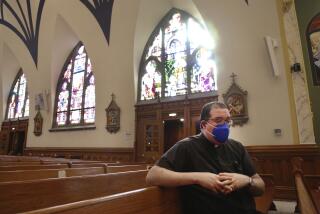Study Calls U.S. Spiritual Revival a Myth
- Share via
Notions of a major American spiritual revival--and particularly spiritual awakening among men--are mythical, according to surveys of religious behavior by the Barna Research Institute.
“There does not seem to be revival taking place in America,” George Barna, the institute’s director, said in a statement released with the organization’s annual survey.
“Whether that is measured by church attendance, born-again status or theological purity, the statistics simply do not reflect a surge of any noticeable proportions,” Barna said. “The increase in Bible reading may be setting the stage for such a revival, but it does not appear to be occurring at the moment.”
Barna’s organization reports that Bible reading was popular in the early 1990s, then fell out of favor later in the decade. Now, it reports that 40% of adults say they read the Bible in a typical week.
“Church attendance among men has dropped in the past decade, as has Bible reading, Sunday school attendance and church volunteerism. Some good things have happened among men during the ‘90s, but it does not appear that there has been a massive reawakening of the male soul in the last 10 years.”
The institute, which is based in Ventura and studies religious and spiritual trends in America, also reported that 40% of adults attend a church service on a typical Sunday. That figure is relatively unchanged since 1994 but is a significant drop from the early 1990s, when close to half of all adults reported attending churches on Sunday.
The survey showed that born-again Christians continue to represent 41% of adults. The Barna Research Group defines born-again Christians as “people who say they have made a personal commitment to Jesus Christ that is still important in their life today and who say they know they will go to heaven after they die because they have confessed their sins and accepted Jesus Christ as their savior.”
The survey results are based on telephone interviews with a random nationwide sample of 1,002 adults and have a margin of error of plus or minus 3 percentage points.
More to Read
Sign up for Essential California
The most important California stories and recommendations in your inbox every morning.
You may occasionally receive promotional content from the Los Angeles Times.













